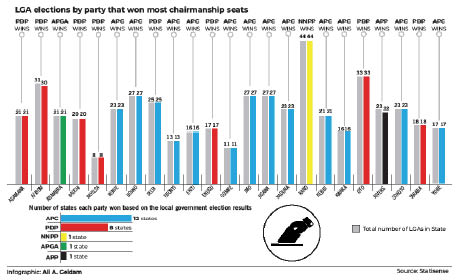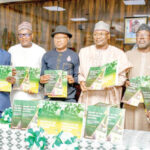While the Supreme Court’s landmark ruling affirming financial autonomy for Nigeria’s 774 local governments and condemning the dissolution of elected councils by state governors had elicited excitement, recent local government elections across the states may have dashed hopes for the genuine change expected with the judgement.
Despite the ruling, which disallows governors from appointing caretaker chairmen for local councils, outcomes across states have revealed entrenched practices and raised fresh calls for a national body to take over local government elections.
The July 11 Supreme Court judgement, which opened a three-month window for states to organise elections or risk losing federal allocations for their local councils, led many states to schedule elections hastily. The rush even extended to Anambra, which hadn’t held local elections in more than 10 years.
Some observers expressed the concern that leaving state governments in charge of conducting the elections would negate the purpose of the ruling, even though the apex court’s ruling had sparked interest and hope in achieving democratic dividends at the local level through periodic elections. As a result, some stakeholders pushed for the dissolution of state electoral commissions and the empowerment of the Independent National Electoral Commission (INEC) to assume responsibility for the administration of local elections.
- #EndBadGovernance: Amnesty, SERAP, lawyers oppose detention of teenage protesters
- Why we want to unbundle railway sector — Transport minister
Local council elections held by the INEC in the Federal Capital Territory are cited by the supporters of this position as evidence that the national electoral organisation can be tasked with guaranteeing free, fair and credible elections throughout the 774 local government areas.
As debate continued, at least 15 states conducted their local government elections, with results that observers and analysts say reflect a predictable pattern: ruling parties swept every council seat in nearly all cases.
In Kano, the New Nigeria People’s Party (NNPP), which only came to power last year, won all 44 local governments; the ruling All Progressives Congress (APC) in Kaduna, Kogi, Sokoto, Benue, Jigawa and Kebbi took every council seat in their respective states. Similarly, the Peoples Democratic Party (PDP) in Bauchi and Enugu, and the All Progressives Grand Alliance (APGA) in Anambra, monopolised the council polls.
Notably, the PDP’s hold in Akwa Ibom allowed Senate President Godswill Akpabio’s local government, Essien Udim, to go to the APC in what observers called a strategic concession by Governor Umo Eno.
In Rivers, where the ruling PDP refrained from participating due to internal disputes, the Action Peoples Party (APP), widely viewed as the party of choice of Governor Siminalayi Fubara, won 22 of the 23 local government areas, while the Action Alliance took the final seat.
Critics contend that these results merely cement the control of ruling parties at the local level, transforming elections into “coronations” for the governor’s chosen candidates.
For those who had hoped the Supreme Court ruling would end governors’ interference in local councils, the reality has been disappointing.
Opposition parties and significant civil society organisations have denounced elections held by various state independent electoral commissions as illegitimate due to the similar theme of the ruling party winning all council seats.
According to Yiaga Africa, a prominent civil society organisation, the majority of the country’s most recent local elections are a travesty of democratic elections and fall short of electoral integrity standards.
In a statement, Samson Itodo, the executive director of Yiaga Africa noted: “To harness the benefits of the Supreme Court ruling granting financial autonomy to local governments, it is crucial to extend electoral reform to local government elections to liberate state independent electoral commissions from the stronghold of state governors by safeguarding their operational and financial independence.”
However, these worries about the election results have heightened calls for the abolition of state electoral bodies and their replacement with an independent national electoral authority like the INEC.
A renowned political analyst, Professor Kamilu Sani Fage, joined the call, stating that even if INEC or another national body takes over local elections, true autonomy requires giving local governments a four-year tenure, like state and federal governments so that all elections can be held simultaneously.
“This approach will prevent governors from assuming control over local governments,” he said.
Currently, most local councils have a three-year tenure, and in some states, it is only two.
Fage believes that unless this two-fold approach is adopted, governors would continue to circumvent any effort to establish true autonomy for the third tier of government.
He added that even “the Economic and Financial Crimes Commission’s (EFCC) effort to monitor local government finances might be circumvented by governors. Therefore, the only solution is to remove local government election from state control.”
Fage continued, “Governors control their political parties, as the major parties make governors the leaders in their respective states. This gives them both constitutional and political power. Local government elections, as they stand, are merely ritualistic.
“Following the Supreme Court ruling, governors have changed tactics: they ensure their allies are in power through the conduct of sham elections and make sure their chosen candidates win. This way, they retain control over local government finances.”
Echoing this sentiment, another analyst, Dr Aminu Hayatu, argued that it is simplistic to assume that local government autonomy would be automatic following the Supreme Court ruling.
“There are processes, and each step must be taken correctly. People need to understand governance and policymaking,” he explained.
Dr Hayatu also agrees that taking local elections away from state governments is a key step towards fair elections and full autonomy for local councils.
“It is crucial for the election process of local officials to be independent. When elections are controlled by governors, it is as if financial autonomy is granted with one hand and withdrawn with the other,” he said.
Regarding the prospect of local governance achieving its intended constitutional status, Hayatu remarked, “There is hope only if autonomy is achieved holistically, with neither their elections nor their finances influenced by governors. If governors retain any control over finances or the electoral process, autonomy remains theoretical.”

 Join Daily Trust WhatsApp Community For Quick Access To News and Happenings Around You.
Join Daily Trust WhatsApp Community For Quick Access To News and Happenings Around You.


